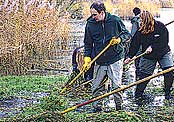 Who are Plantlife?
Who are Plantlife?
Plantlife is now an international organisation but remains the only charity working solely to protect Britain’s wild flowers and plants, fungi and lichens, and the habitats in which they are found.
How you can help
Help Plantlife by looking out for three of the UK’s most destructive plant invaders! Your support will help the conservation charity to understand the extent to which our gardens and countryside are under threat.
- Imported plants can be fast growing and can quickly become invasive in the countryside.
- They can grow quickly, taking over natural habitats, out competing native plants and sometimes blocking up ponds and rivers.
- Some problem species are still sold in garden centres. Unclear labelling can result in well-meaning gardeners buying invasive species.
- Climate change may lead to some species that are not currently a problem becoming invasive in the future.
- Control and eradication of invasive plants is extremely difficult and expensive, sometimes running into millions of pounds.
Plantlife’s Plant Invaders Survey
 This survey asks the public to look out for three of the UK’s most invasive plants: Japanese Knotweed, Indian Balsam and New Zealand Pigmyweed. Plantlife is keen to know what type of habitat has been invaded (e.g. woodland) as well as the approximate number of plants.
This survey asks the public to look out for three of the UK’s most invasive plants: Japanese Knotweed, Indian Balsam and New Zealand Pigmyweed. Plantlife is keen to know what type of habitat has been invaded (e.g. woodland) as well as the approximate number of plants.
New Zealand Pigmyweed is well known to Plantlife as it seriously threatens the survival of Starfruit (Damasonium alisma), one of Britain’s rarest plants. It has been recorded at over a third of the sites for this species, making periodic appearances despite intensive treatment. A major site for Brown Galingale (Cyperus fuscus) is also infested with Pigmyweed, as are many Pillwort (Pilularia globulifera) sites. The story is always the same, wherever these invasive species appear the populations of rare native plants plummet within a few years unless drastic and costly action is carried out.
How can you help?
- Be aware: Plantlife is campaigning to ban the sale of the most destructive plant invaders. Please visit their website for more information about the survey and the problems of invasive plants:
- Help stop the spread and take part in Plantlife’s Plant Invaders Survey:
- Write to Plantlife at: 14 Rollestone Street, Salisbury, SP1 1DX.
 Harlequin ladybird
Harlequin ladybird






 This survey
This survey Harlequin ladybird
Harlequin ladybird